Trending Now
We have updated our Privacy Policy and Terms of Use for Eurasia Group and its affiliates, including GZERO Media, to clarify the types of data we collect, how we collect it, how we use data and with whom we share data. By using our website you consent to our Terms and Conditions and Privacy Policy, including the transfer of your personal data to the United States from your country of residence, and our use of cookies described in our Cookie Policy.
{{ subpage.title }}
Palestinian baby Reem Abu Hayya, 8 months old, is being cared for by her grandmother in the family home in the town of Abasan al-Kabira, east of Khan Yunis Palestinian baby Reem Abu Hayya, 8 months old, is being cared for by her grandmother in the family home in the town of Abasan al-Kabira, east of Khan Yunis in the southern Gaza Strip, on October 29, 2024.
Hard Numbers: US asks Israel to explain ‘horrifying’ airstrike, Deadly post-election violence in Mozambique, Washington Post hemorrhaging subscribers, Sudan civil war continues to fuel displacement
93: The US is asking Israel for answers regarding a Tuesday airstrike on a residential building in northern Gaza that left at least 93 Palestinians dead or missing. A State Department spokesperson described the strike as a “horrifying incident with a horrifying result."
11: Security forces in Mozambique killed at least 11 people last week amid protests sparked by a disputed presidential election, Human Rights Watch said Tuesday. The rights group called for an investigation into the “excessive use of force” against demonstrators in the southern African nation. Daniel Chapo, candidate of the ruling Frelimo party, was declared the winner but observers said the election was not free and fair.
250,000: The Washington Post reportedly lost over 250,000 subscribers in recent days in the face of backlash over owner Jeff Bezos’ decision to block the paper from endorsing Vice President Kamala Harris. This represents roughly 10% of the paper’s paid circulation.
14 million: Over 14 million people are displaced in Sudan, the head of the International Organization for Migration said on Tuesday, with roughly 11 million internally displaced and over three million who have crossed borders. Sudan has been consumed by a brutal civil war since April 2023, which has fueled a devastating humanitarian crisis and seen waves of people flee their homes.Biden's mistakes in Afghanistan were not "dereliction of duty"
In his latest Washington Post op-ed, Marc Thiessen makes strong statements about how and why the Taliban came to take control of Kabul. There have been big mistakes in executing this exit. But "dereliction of duty?" Not in our view. Ian Bremmer and Eurasia Group analyst Charles Dunst explain why in this edition of The Red Pen.
Today we're taking our Red Pen to a recent op-ed from the Washington Post written by Marc Thiessen, a Post columnist, American Enterprise Institute fellow, and former speechwriter for President George W. Bush. It's titled, "Greenlighting the Taliban's takeover of Kabul is a national disgrace," and makes some strong statements about how and why the Taliban came to take control of Afghanistan's capital city. I want to unpack some of his arguments for you and explain why we disagree. So, let's get out the Red Pen.
First, Thiessen argues that "all the horrors the world witnessed over the past two weeks…might have been prevented" had the United States opted to take over Kabul, rather than letting the Taliban do so.
Let's remember: "The enemy gets a vote." Thiessen is comparing the real world, with all of its unpredictability, to a counterfactual one where everything goes according to (his) plan. Even if the horrors he cited had been averted, wouldn't others have unfolded? Putting thousands of Americans back on Kabul's streets would have meant putting them in the crosshairs of terrorist groups like ISIS-K. Do we believe these groups wouldn't have targeted Americans in Kabul with suicide bombings, like the recent airport attack, or even engage them in firefights? Biden had to decide between two unpalatable options. He chose the one he believed would put the fewest Americans in harm's way.
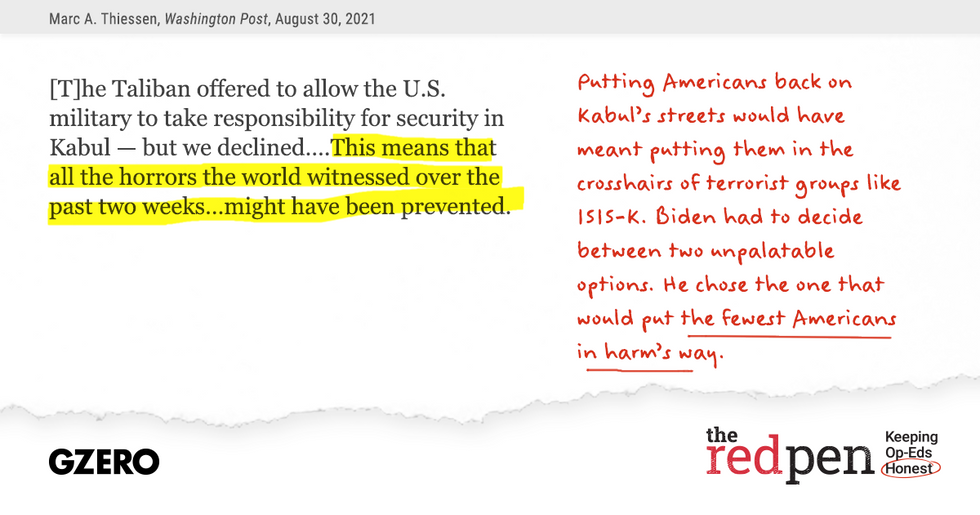
Next, Thiessen cites a former American senior general officer to argue that the "US military could definitely have secured the capital"––at least the green zone where Western embassies are located, plus access to the airport.
For starters, Thiessen bases his argument on the views of one "former senior general officer" whose identity we don't know. How widely shared are those views among current military officials? If the 20-year war has taught us anything, it should be some caution before arguing the United States could secure a city of over six million people indefinitely with a few thousand troops. Before leaving office, the Trump administration brought US troop numbers in Afghanistan to just 2,500, a 19-year low. By the end of July 2021, only 650 remained. Taking over Kabul would've required something politically incredibly challenging: a substantial troop surge that would've put more Americans in danger. Thiessen doesn't explicitly call for a surge, but the upshot of his critique is clear enough. There's an argument for a surge (even if politically very unpopular), he should tell us how many additional troops we would have to send in and for how long to hold onto a city the United States had already lost.
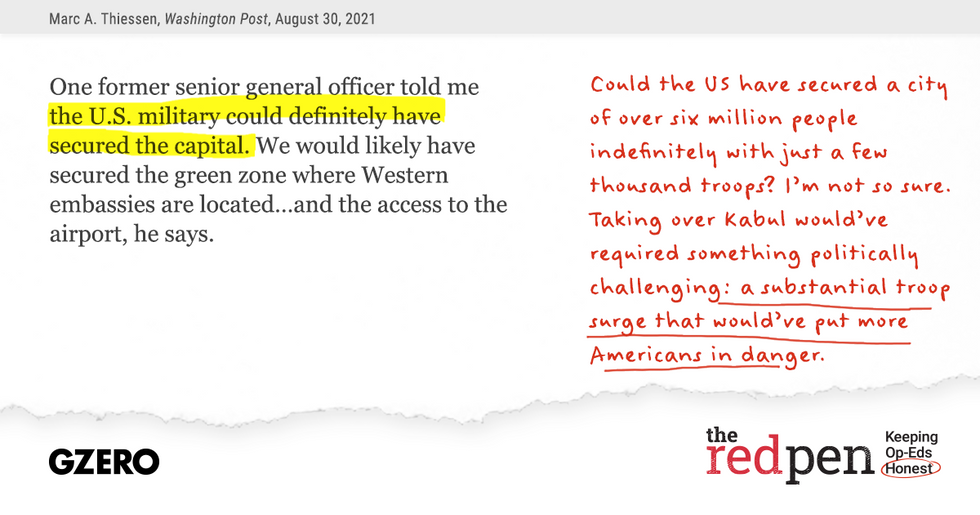
Thiessen also calls the Biden administration's decision to "cede" Kabul to the Taliban "a dereliction of duty unlike any we have seen in modern times."
Keep in mind it was Trump, not Biden, who went over the Afghan government's head back in February 2020 to negotiate with the Taliban and agree to remove all US troops from the country. There were US political considerations for doing so, I get it. But from that point, the Taliban's takeover of Kabul had, at that point, become a foregone conclusion
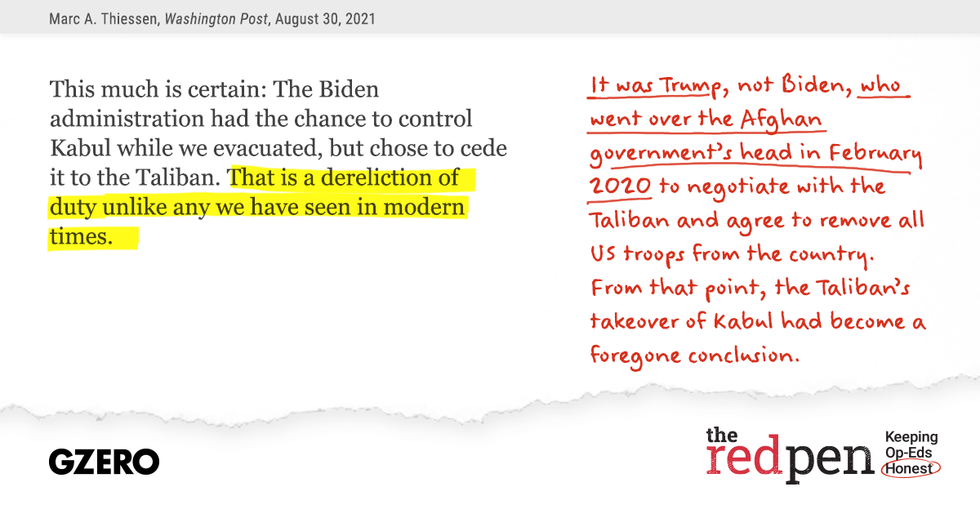
Next point: Thiessen writes that the administration's withdrawal "put the safety of American civilians, service members and Afghan allies in the hands of terrorists" — referring to the Taliban — "rather than the U.S. armed forces" and "led directly to the deaths of 13 Americans in an Islamic State attack on the Kabul airport."
Earlier, though, he almost presents the Taliban as an organization whose word General McKenzie should've trusted: "[T]he Taliban offered to allow the US military to take responsibility for security in Kabul — but we declined." What makes him believe a terrorist organization intent on retaking power would honor a pledge to allow US forces to secure the capital city? Which Taliban is it?
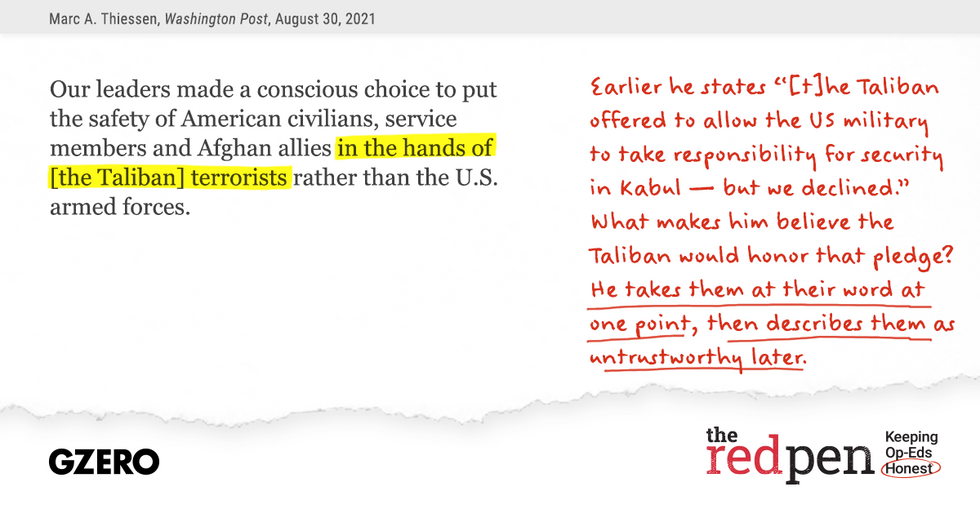
Finally, Thiessen concludes by arguing that Biden's decision to let the Taliban take over Kabul "led directly to the deaths of 13 Americans in an Islamic State attack on the Kabul airport."
Harrowing as the images coming out of Afghanistan are, Biden had decided to not risk even more US lives in the war's twilight. Staying at the airport and trying to hold onto Kabul for a few more weeks would have helped the United States evacuate more Afghan partners, but it would also have risked the lives of thousands of US soldiers.
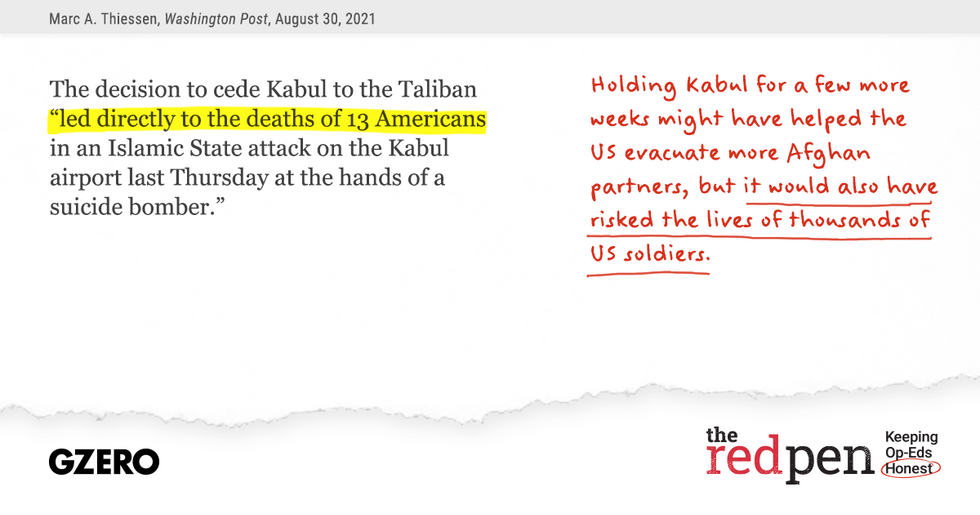
One thing I think many of us agree on — this has been a sad and embarrassing ending to the 20-year war in Afghanistan. We've left countless Afghan allies behind, despite promising them safe passage. August's events will no doubt cast an added shadow of grief over the coming anniversary of the 9/11 attacks. The Biden team certainly made mistakes in executing this exit. But "dereliction of duty?" No, not in my view.
- Afghanistan: Four key failures - GZERO Media ›
- Can Biden recover from his Afghanistan debacle? - GZERO Media ›
- The US couldn't have won in Afghanistan - but Biden's mistakes lost ... ›
- Biden's speech on Afghanistan ignores serious failures; Afghan ... ›
- Calamitous withdrawal from Afghanistan was a crisis of Biden’s own making - GZERO Media ›
Israel-UAE relations & the Abraham Accords are not at risk under Biden
In a Washington Post op-ed, commentator Hugh Hewitt states his concern that President Biden will continue his streak of policy reversals in the Middle East, specifically regarding the peace deals that Trump brokered in his final year in office. But in fact, Biden has consistently supported the Abraham Accords, even during the heat of the presidential campaign. Ian Bremmer and Eurasia Group analysts Jeffrey Wright and Sofia Meranto take out the Red Pen to point out that Hewitt may be overreacting to Biden's recent freeze on a fighter jet deal to the UAE.
We're taking our Red Pen to an op-ed from the Washington Post, written by well-known radio host and columnist Hugh Hewitt. It's titled, "The Biden Administration could derail the Abraham Accords. It mustn't."
Hewitt is arguing that one of the most important foreign policy accomplishments of the Trump presidency, no question there, the normalization of diplomatic relations between Israel and the UAE, Bahrain, Sudan and Morocco should not be unraveled by President Biden and his foreign policy team.
Now in fairness, President Biden has spent the bulk of his first few weeks in office undoing many of Trump's policy decisions. Rejoining the Paris Climate Accord for example, and the World Health Organization, ending the Muslim ban, reversing the ban on transgender people joining the military, to name just a few. But does that mean the Abraham Accords are kaput? Not a chance. Let's get out the red pen.
Hewitt hangs the bulk of his evidence on a specific aspect of the deal with the UAE involving the sale of US fighter jets to the Gulf nation. The Biden administration has halted that sale for the moment. And Hewitt writes, "With the announcement last week that the new administration will review a sale of a batch of fighter jets to the UAE, one of the most important diplomatic achievements could be in question."
That's a really big leap. To be clear, we're talking about one specific aspect of the deal, for starters, not the whole enchilada. Let's look at the context. It's not actually unusual for a new administration, either Democrat or Republican, to press pause on arms sales initiated by the previous one. It happens frequently, and those deals usually tend to get approved and eventually move forward. Further, the UAE doesn't seem all too worried. Its US Embassy, which had fantastically close relations with Jared Kushner in the Trump administration, tweeted that the pause was expected, and the nation is looking forward to working with the Biden administration.
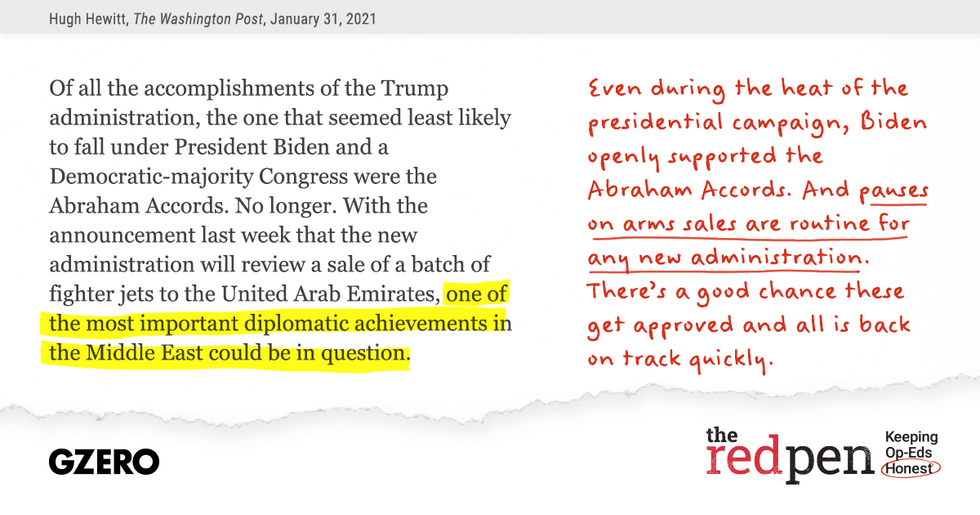
Next, Hewitt argues that the fighter jets are "the crucial glue holding together US interests in the regions" and that the Abraham Accords could unravel without them. The Accord was important because it recognized the reality that Israel and the Gulf States had actually built a productive and quiet relationship, something frankly not appreciated under the previous Obama-Biden administration. The Trump deal didn't actually create that relationship, though it certainly did help it along. Remember, Trumps first trip as president was actually to Saudi Arabia and Israel, very unusual. And the UAE is not about to throw away its relationship with Israel, which it finds strategically very important, much less with the United States it's critical ally, even if the fighter jet sale were to go south. Which again, we don't expect.
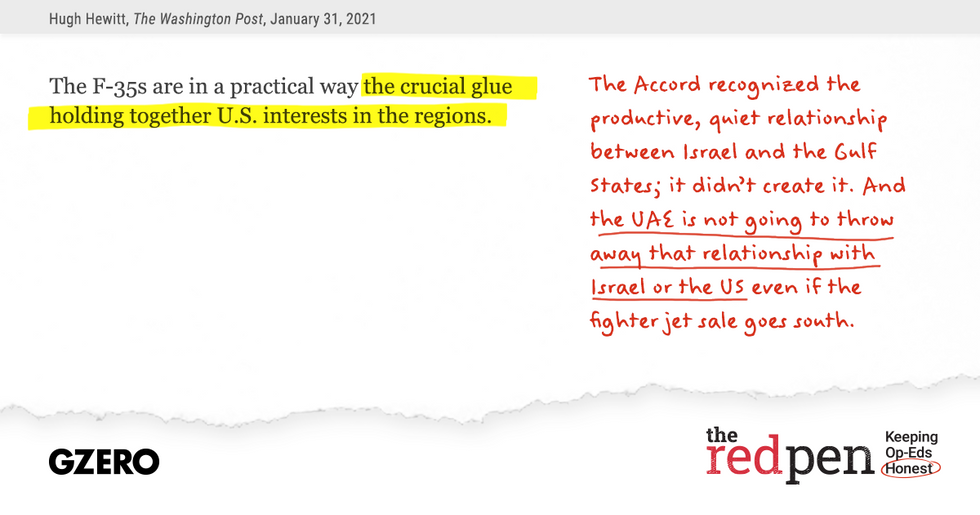
Hewitt also writes, "The Iranians are not happy that the UAE may prove to be our wingman in any future conflict with the mullahs in Tehran." Well, to be fair, the UAE didn't actually sign up to be a "wingman." The US and UAE have differing views about the threat that's posed by Iran. And the Iranians are more concerned about the political alignment against them than they are more fighter jets in the region.
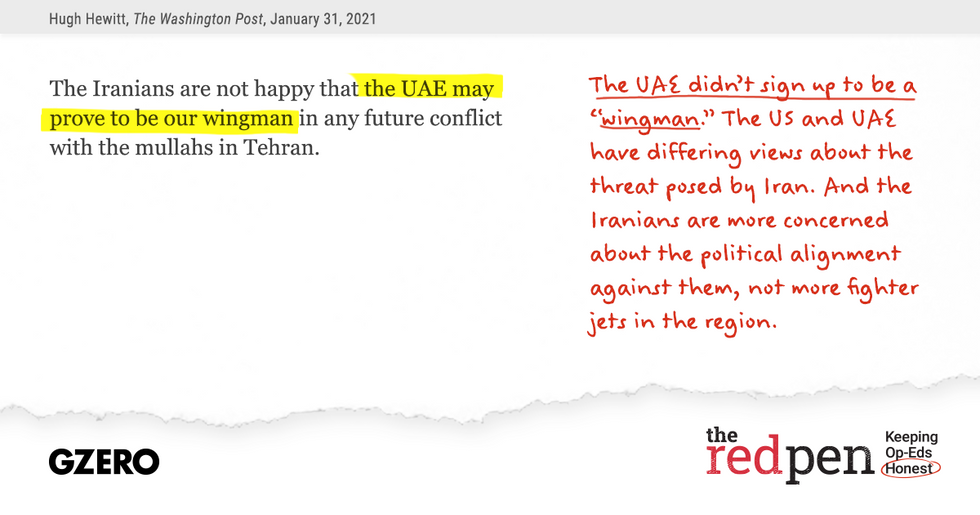
And finally, if you want to have a better sense of where the Biden Administration is heading on this issue, all you have to do is look at what they've already publicly said. During his Senate confirmation hearing, Secretary of State Tony Blinken said the US would keep its embassy in Jerusalem. And National Security Advisor Jake Sullivan described the Abraham Accords as "positive" for both security and the economy in the Middle East. Two big Trump accomplishments that the Biden team is absolutely signed up for. And keep in mind that even at the height of an incredibly heated presidential campaign, Joe Biden himself never denounced the deal. In fact, he actually openly supported it.
So, a great undoing really isn't in the works, at least when it comes to the Abraham Accords. We can expect a different approach to a lot of things in the Middle East from the Biden Administration, in terms of the Iranian Nuclear deal for example, no question. Also, restoring aid to and diplomacy with Palestinians who were not directly engaged in the Trump deal.
But a 180 on the Abraham Accords, that's not happening.
So, that's your Red Pen for this week. Stay safe, stay warm, and watch the Super Bowl, but be sure to avoid people. Talk to you soon.
"Fixing" US foreign policy isn't the real challenge Biden would face
Josh Rogin's Washington Post op-ed argues that Donald Trump's assault on US foreign policy could take decades to repair. But Rogin gives Trump too much credit and misses the real challenge to American global leadership. Ian Bremmer and Eurasia Group analyst Jeffrey Wright use The Red Pen to keep the op-ed honest.
Today, we're taking our red pen to an op-ed from the Washington Post written by Josh Rogin, a columnist for the Global Opinions section.
The piece is called "U.S. foreign policy might be too broken for Biden to fix" it. I mean, we could start with the title--which encapsulates just how much we feel Josh overstates the damage done in the past four years and fails to recognize the resilience of US institutions in general.
But let's get specific.
Number one, Rogin writes that President Trump has attacked "the previous bipartisan consensus that the United States has a unique duty to lead a global world order based on the advancement of freedom, human rights and the rule of law."
Hey, Josh—the Iraq War, GITMO, and drone strikes are calling. They want you to know America acted unilaterally long before Trump became President. It's true. President Trump was the first to say "America First" out loud—(I mean, since we tried to stay out of WWII, that is)--but it's far from a new philosophy.
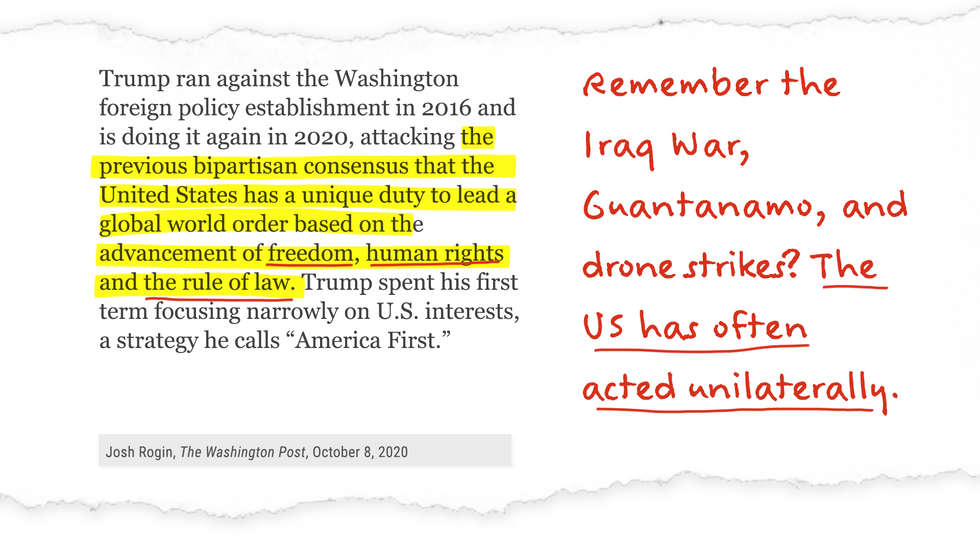
Number two, on the point of Trump potentially having broken the systems critical to diplomacy, he writes, "It could take decades to repair the institutions Trump intentionally damaged…"
Now sure, Trump gutted the State Department and he's clogged up the World Trade Organization, and this is…a bad thing. Though we'd argue the institutions are resilient and it won't take decades for them to bounce back, if we want to actually rebuild them. While others, so far, he's talked a big game, but hasn't done very much—take NATO, the IMF, the United Nations, even the World Health Organization.
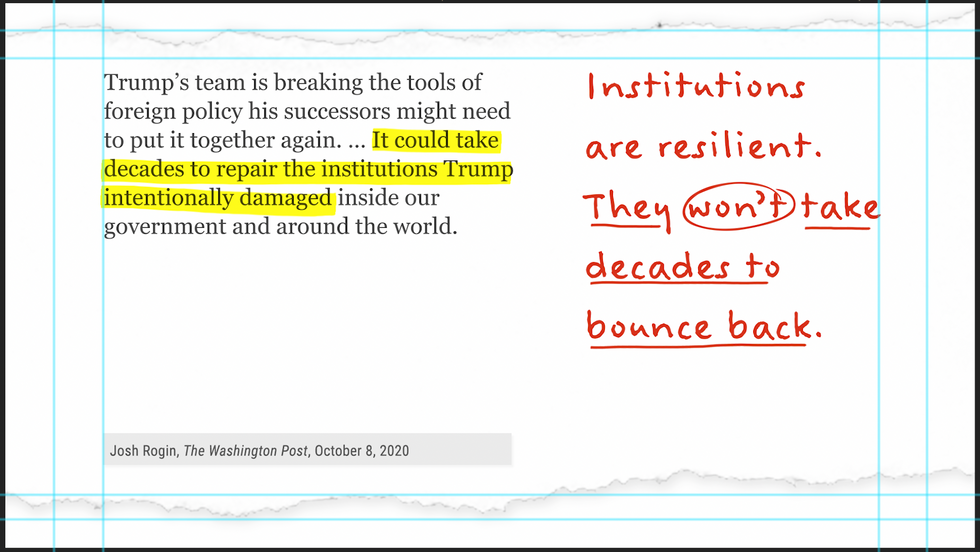
On Iran, Rogin writes "Biden can't return to the Iran deal but won't be able to strike a new one.
Who says? I mean, I'm not saying a new deal with Iran will be easy (the last one wasn't, and it wasn't exactly comprehensive), but Biden is going to resume negotiations (if he becomes president) and will have broad international support for doing so. Plus, Iran is in far more desperate economic shape now than they were four years ago. They're incented.
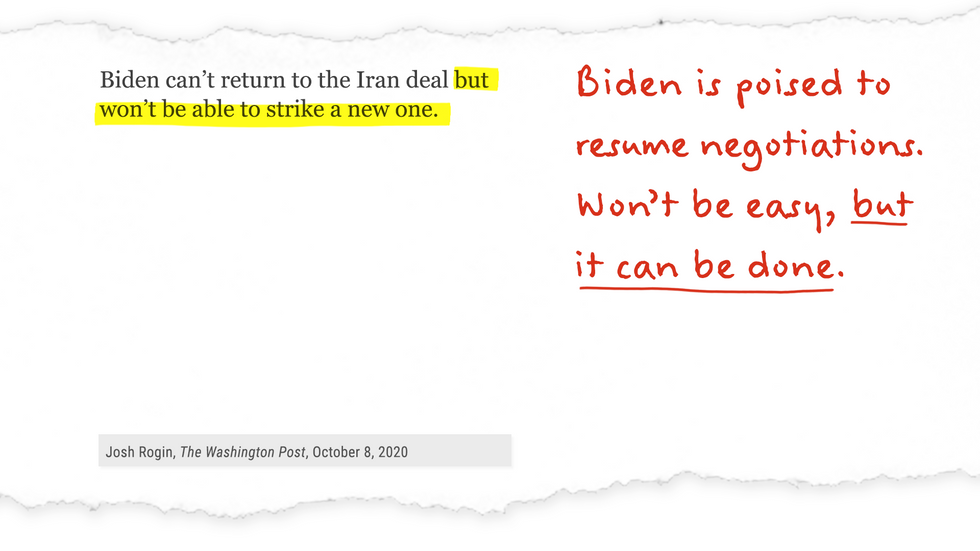
I also think there's a big point about the United States that Rogin's article ignores. The barriers to becoming the world's policeman again aren't just partisanship—or because of Trump's presidency or GOP leadership in Congress. Polls consistently show that Americans are tired of so-called "endless wars" and extensive international engagement. There's also real discontent about US trade policy--which many feel hasn't done much to help everyday Americans.
Joe Biden, should he win on November 3 or later,will face major challenges in restoring global leadership—but they aren't just coming from Republicans or Trump supporters. He would have to overcome domestic political opposition—including from a lot of Democrats—if he wants to set the nation on a different path.
Breathing while Black: WaPo's Karen Attiah on racial injustice
In the latest episode of GZERO World, Ian Bremmer explores international reaction to the murder of George Floyd and global protests against police brutality and racism. Karen Attiah, Global Opinions Editor of The Washington Post, explains her view that, on issues of race and inequality, the U.S. is a "developing country," and while this moment of uprising offers hope for real change there is still much work to be done.
Attiah discusses protesters taking to the streets despite fears of the COVID pandemic, and the centuries-long struggle black Americans have faced on the road to equality. Attiah also reflects on the 2018 murder of her Washington Post colleague Jamal Khashoggi, killed inside the Saudi consulate in Istanbul.
- US global reputation a year after George Floyd's murder; EU sanctions against Belarus; Olympics outlook - GZERO Media ›
- US global reputation a year after George Floyd's murder; EU sanctions against Belarus; Olympics outlook - GZERO Media ›
- Podcast: How we got here: Evaluating 1619 and US history with Nikole Hannah-Jones - GZERO Media ›
Washington Post’s Karen Attiah: U.S. a “developing country” on race, equality
In a personal and insightful interview with GZERO World host Ian Bremmer, Washington Post Global Opinion Editor Karen Attiah discusses this charged moment of unrest in America, and her own family's experiences with racism. Attiah, the daughter of Ghanaian immigrants, describes her father's journey from learning of Emmett Till's murder as a young boy to being cautious of police officers in Texas, despite the fact he was a successful doctor.
The complete interview is part of the latest episode of GZERO World, and begins airing today, Friday, June 19, nationally on public television stations. Check local listings and visit gzeromedia.com for more.
Media in 60 Seconds: What Young Journalists Laid Off Should Do
Have you just been laid off from your digital media job? Here's what you should do.
It's Media in 60 Seconds with Isabelle Roughol!





